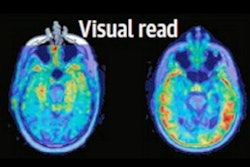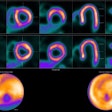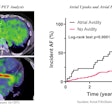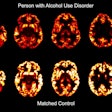
Tau PET imaging consistently provides the best prediction of change in cognitive function in Alzheimer's disease patients with mild cognitive impairment or mild dementia, a Swedish group has found.
Researchers at Lund University investigated the ability of tau-PET versus other potential biomarkers for predicting cognitive decline in patients over two years. They found baseline tau PET was the strongest independent predictors of cognitive decline.
"Many individual biofluid and imaging biomarkers have been shown to be able to predict future cognitive decline," wrote corresponding author Dr. Oskar Hansson, PhD, in a study published December 14 in Alzheimer's and Dementia: The Journal of the Alzheimer's Association. "However, a comprehensive head-to-head study of the individual contribution of the most relevant biomarkers, such as tau PET and plasma phosphorylated tau (p-tau), is lacking."
To elucidate the issue, the researchers searched studies in the medical literature for individuals who participated in previous Alzheimer's disease clinical trials. They identified 118 patients with complete datasets for all studied biomarkers. Cognitive decline was computed as the change (slope) in Mini-Mental Status Exam scores per year and was correlated to the following: cortical atrophy on MRI, baseline cognition, apolipoprotein E gene (APOE) status, plasma and cerebrospinal fluid (CSF) levels of p-tau217, neurofilament light chain (NfL), and beta amyloid 42/40 ratio (individually and in combination).
In a statistical analysis, the biomarker exhibiting the best independent prediction of cognitive decline in patients with amnestic MCI or amnestic dementia over two years was tau-PET. The authors found that baseline tau-PET radiotracer uptake values showed the highest t-values, R2, and lowest Akaike information criterion values when each biomarker was used individually to predict change in cognition.
"The results imply that tau-PET might be an important addition to the diagnostic work-up of [Alzheimer's disease] in clinical practice and trials when prognostic information is of importance," the group wrote.
From a clinical perspective, knowing the likelihood that a patient in the clinic will remain stable or is likely to significantly deteriorate over a relevant time interval is of great importance, the authors added. "How quickly does my memory deteriorate?" was recently listed as the most important question to be answered by both Alzheimer's disease patients and caregivers in a survey study, they noted.
In closing, the group offered: "By knowing the tau PET status, the baseline performance on a few brief cognitive screening tests, and NfL, a prediction can now be made using an easy-to-use online tool developed using the results of the present study."
The tool is available here.






![Coronal and axial slice of the average cortical F-18 MK-6240 SUVR [standard uptake value ratio] image for each study population. SUVR images were corrected for partial volume effects and masked with the gray matter mask used for volume of interest delineation. Overall tau accumulation is comparable between the late-life depression (LLD, middle column) and non-depressed cognitively unimpaired comparison (HC, left column) groups, while abnormal tau accumulation, which is most pronounced in the mesial temporal lobe, can be seen in the mild cognitive impairment due to Alzheimer's disease group (right column). Image and caption courtesy of the American Journal of Geriatric Psychiatry.](https://img.auntminnie.com/files/base/smg/all/image/2024/07/Tau_depressed.66a16540ee0a1.png?auto=format%2Ccompress&fit=crop&h=167&q=70&w=250)














